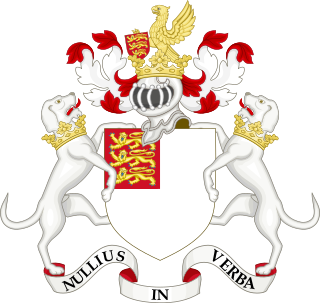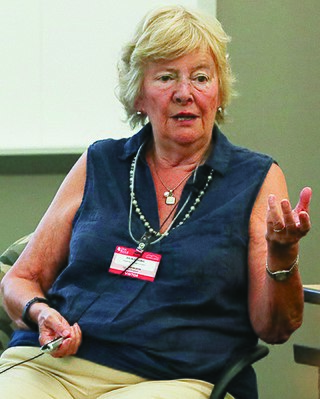Related Research Articles

Toxicology is a scientific discipline, overlapping with biology, chemistry, pharmacology, and medicine, that involves the study of the adverse effects of chemical substances on living organisms and the practice of diagnosing and treating exposures to toxins and toxicants. The relationship between dose and its effects on the exposed organism is of high significance in toxicology. Factors that influence chemical toxicity include the dosage, duration of exposure, route of exposure, species, age, sex, and environment. Toxicologists are experts on poisons and poisoning. There is a movement for evidence-based toxicology as part of the larger movement towards evidence-based practices. Toxicology is currently contributing to the field of cancer research, since some toxins can be used as drugs for killing tumor cells. One prime example of this is ribosome-inactivating proteins, tested in the treatment of leukemia.

The Royal Astronomical Society (RAS) is a learned society and charity that encourages and promotes the study of astronomy, solar-system science, geophysics and closely related branches of science. Its headquarters are in Burlington House, on Piccadilly in London. The society has over 4,000 members ("Fellows"), most of them professional researchers or postgraduate students. Around a quarter of Fellows live outside the UK.
The Science Council is a UK organisation that was established by Royal Charter in 2003. The principal activity of The Science Council is the promotion of the advancement and dissemination of knowledge of and education in science pure and applied, for the public benefit. The Science Council is the Competent Authority with respect to the European Union directive 2005/36/EC. It is a membership organisation for learned and professional bodies across science and its applications and works with them to represent this sector to government and others. Together, the member organisations represent over 350,000 scientists. The Science Council provides a forum for discussion and exchange of views and works to foster collaboration between member organisations and the wider science, technology, engineering, mathematics and medical communities to enable inter-disciplinary contributions to science policy and the application of science.

The Royal Society, formally The Royal Society of London for Improving Natural Knowledge, is a learned society and the United Kingdom's national academy of sciences. The society fulfils a number of roles: promoting science and its benefits, recognising excellence in science, supporting outstanding science, providing scientific advice for policy, education and public engagement and fostering international and global co-operation. Founded on 28 November 1660, it was granted a royal charter by King Charles II as The Royal Society and is the oldest continuously existing scientific academy in the world.

The Royal Society of Chemistry (RSC) is a learned society in the United Kingdom with the goal of "advancing the chemical sciences". It was formed in 1980 from the amalgamation of the Chemical Society, the Royal Institute of Chemistry, the Faraday Society, and the Society for Analytical Chemistry with a new Royal Charter and the dual role of learned society and professional body. At its inception, the Society had a combined membership of 34,000 in the UK and a further 8,000 abroad. The headquarters of the Society are at Burlington House, Piccadilly, London. It also has offices in Thomas Graham House in Cambridge where RSC Publishing is based. The Society has offices in the United States, on the campuses of The University of Pennsylvania and Drexel University, at the University City Science Center in Philadelphia, Pennsylvania, in both Beijing and Shanghai, China and in Bangalore, India.

BCS, The Chartered Institute for IT, known as the British Computer Society until 2009, is a professional body and a learned society that represents those working in information technology (IT) and computer science, both in the United Kingdom and internationally. Founded in 1957, BCS has played an important role in educating and nurturing IT professionals, computer scientists, computer engineers, upholding the profession, accrediting chartered IT professional status, and creating a global community active in promoting and furthering the field and practice of computing.

The Cambridge Philosophical Society (CPS) is a scientific society at the University of Cambridge. It was founded in 1819. The name derives from the medieval use of the word philosophy to denote any research undertaken outside the fields of law, theology and medicine. The society was granted a royal charter by King William IV in 1832. The society is governed by an elected council of senior academics, which is chaired by the Society's President, according to a set of statutes.

Dame Julia Stretton Higgins is a British polymer scientist. Since 1976 she has been based at the Department of Chemical Engineering at Imperial College London, where she is emeritus professor and senior research investigator.

The Royal Society Te Apārangi is an independent, statutory not-for-profit body in New Zealand providing funding and policy advice in the fields of sciences and the humanities.
The Academy of Social Sciences is a representative body for social sciences in the United Kingdom. The Academy promotes social science through its sponsorship of the Campaign for Social Science, its links with Government on a variety of matters, and its own policy work in issuing public comment, responding to official consultations, and organising meetings and events about social science. It confers the title of Fellow upon nominated social scientists following a process of peer review. The Academy comprises over 1000 Fellows and 41 learned societies based in the UK and Europe.

The Institute of Physics and Engineering in Medicine (IPEM) is the United Kingdom's professional body and learned society for physicists, engineers and technologists within the field of medicine, founded in 1995, changing its name from the Institution of Physics and Engineering in Medicine and Biology (IPEMB) in 1997. The Institute is governed by an elected Board of Trustees reporting to which are the Science, Research and Innovation Council and the Professional and Standards Council. The councils have operational responsibility for scientific and professional aspects of the Institute's work, respectively. Beneath the councils is a substructure of committees, groups and panels of members, which undertake the work of the Institute.
The British Thoracic Society (BTS) was formed in 1982 by the amalgamation of the British Thoracic Association and the Thoracic Society. It is a registered charity and a company limited by guarantee.

John Edward Casida was an American entomologist, toxicologist and professor at the University of California, Berkeley.

The Royal Microscopical Society (RMS) is a learned society for the promotion of microscopy. It was founded in 1839 as the Microscopical Society of London making it the oldest organisation of its kind in the world. In 1866, the society gained its royal charter and took its current name. Founded as a society of amateurs, its membership consists of individuals of all skill levels in numerous related fields from throughout the world. Every year since 1841, the society has published its own scientific journal, the Journal of Microscopy, which contains peer-reviewed papers and book reviews. The society is a registered charity that is dedicated to advancing science, developing careers and supporting wider understanding of science and microscopy through its Outreach activities.
Ali Said Faqi is a Somali scientist specializing in toxicology and a diplomat. A leading researcher in his field, he has numerous scientific papers and also authored a book entitled A Comprehensive Guide to Toxicology in Preclinical Drug Development. In 2013, he was appointed as the Somali Ambassador to Benelux and European Union.
The British Neuroscience Association (BNA) is a scientific society with around 2,500 members. Starting out as an informal gathering of scientists meeting at the Black Hourse Public House in London to discuss brain-related topics, on the 23rd of February 1968 it was formerly established as the Brain Research Association, and subsequently relaunched as the British Neuroscience Association in 1997.

Dame Lesley Anne Glover is a Scottish biologist and academic. She was Professor of molecular biology and cell biology at the University of Aberdeen before being named Vice Principal for External Affairs and Dean for Europe. She served as Chief Scientific Adviser to the President of the European Commission from 2012 to 2014. In 2018 she joined the Principal's senior advisory team at the University of Strathclyde.
The American College of Toxicology (ACT) is a professional association dedicated to providing an interactive forum for the advancement and exchange of scientific information in the field of toxicology.
John Paul Giesy Jr. is an American ecotoxicologist. He is a Full Professor and Canada Research Chair in Environmental Toxicology at the University of Saskatchewan. Giesy was credited with being the first scientist to discover toxic per- and poly-fluoroalkyl [PFAS] chemicals in the environment. His discoveries also include the photo-enhanced toxicity and the presence of perfluorinated chemicals in the environment.

Mahdi Balali-Mood is an Iranian medical toxicologist, and professor of medicine, clinical pharmacology and toxicology. He was awarded OPCW-The Hague Award in recognition of his pioneering work in clinical management of victims of chemicals weapons and dedicating his career to caring and advocating for the victims of chemical weapons. He is credited as the father of Toxicology of Iran.